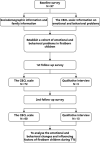Emotional and Behavioral Changes in Preschool Firstborn Children During Transition to Siblinghood: A Mixed Methods Study
- PMID: 37292056
- PMCID: PMC10246780
- DOI: 10.2147/PRBM.S411729
Emotional and Behavioral Changes in Preschool Firstborn Children During Transition to Siblinghood: A Mixed Methods Study
Abstract
Purpose: To help firstborn children in families expecting a second child navigate the role transition more smoothly, we investigated the emotional and behavioral changes of firstborn children during the transition to siblinghood (TTS) and the factors that contribute to these changes.
Patients and methods: From March to December 2019, a total of 97 firstborn children (Mage=3.00± 0.97, and female = 51) were included in the study through a questionnaire survey of their mothers, and two follow-up visits were conducted in Chongqing, China. Individual in-depth interviews were conducted with 14 mothers.
Results: Both quantitative and qualitative results suggest that emotional and behavioral problems of firstborn children tend to increase during TTS, particularly in issues such as anxiety/depression, somatic complaints, withdrawal, sleep problems, attention problems, and aggressive behavior, as well as internalization problems, externalization problems and total problems in the quantitative study (P<0.05). A poor father-child relationship may increase emotional and behavioral problems in firstborn children (P=0.05). Further qualitative analysis found that younger age and outgoing personality of the firstborn child may improve the emotional and behavioral problems.
Conclusion: The firstborn children did have more emotional and behavioral problems during TTS. But these problems can be regulated by family factors and their own characteristics.
Keywords: emotion and behavior; firstborn children; mixed method; preschool; transition to siblinghood.
© 2023 Zhang et al.
Conflict of interest statement
The authors declared that they have no conflicts of interest to disclose for this work.
Figures







Similar articles
-
Emotional and Behavioral Changes and Related Factors of Firstborn School-Aged Compared to Same Age Only Children.Front Public Health. 2022 Mar 3;10:822761. doi: 10.3389/fpubh.2022.822761. eCollection 2022. Front Public Health. 2022. PMID: 35309215 Free PMC article.
-
Maternal and paternal trajectories of depressive symptoms predict family risk and children's emotional and behavioral problems after the birth of a sibling.Dev Psychopathol. 2019 Oct;31(4):1307-1324. doi: 10.1017/S0954579418000743. Dev Psychopathol. 2019. PMID: 30394259 Free PMC article.
-
And baby makes four: predictors of attachment security among preschool-age firstborns during the transition to siblinghood.Child Dev. 1996 Apr;67(2):579-96. Child Dev. 1996. PMID: 8625729
-
[The relationship between maternal emotional symptoms during pregnancy and emotional and behavioral problems in preschool children: a birth cohort study].Zhonghua Yu Fang Yi Xue Za Zhi. 2016 Feb;50(2):129-35. doi: 10.3760/cma.j.issn.0253-9624.2016.02.006. Zhonghua Yu Fang Yi Xue Za Zhi. 2016. PMID: 26926720 Chinese.
-
Family transitions following the birth of a sibling: an empirical review of changes in the firstborn's adjustment.Psychol Bull. 2012 May;138(3):497-528. doi: 10.1037/a0026921. Epub 2012 Jan 30. Psychol Bull. 2012. PMID: 22289107 Free PMC article. Review.
References
-
- Gil Madrona P, Romero Martínez SJ, Sáez-Gallego NM, Ordóñez Camacho XG. Psychomotor limitations of overweight and obese five-year-old children: influence of body mass indices on motor, perceptual, and social-emotional skills. Int J Environ Res Public Health. 2019;16(3):427. doi:10.3390/ijerph16030427 - DOI - PMC - PubMed
LinkOut - more resources
Full Text Sources

